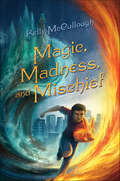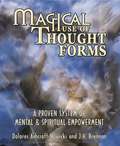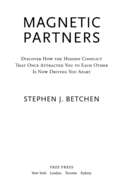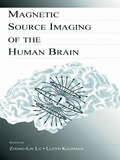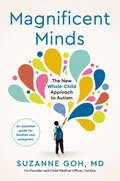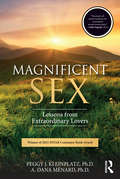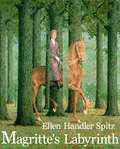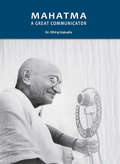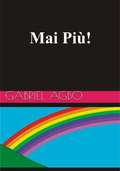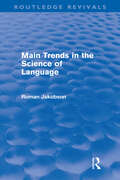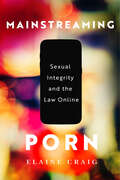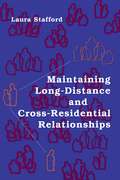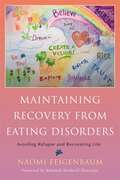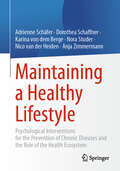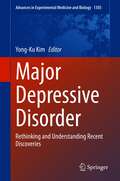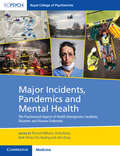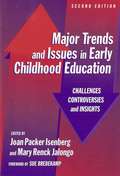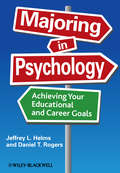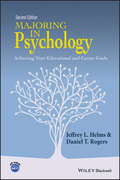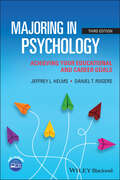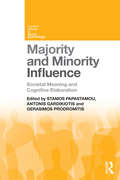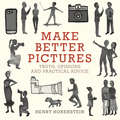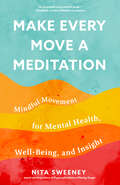- Table View
- List View
Magic, Madness, and Mischief
by Kelly McCulloughFrom the author of School for Sidekicks comes a witty and thoughtful middle-grade fantasy about the bonds of family and the strength of true friendship. Kalvan Monroe is worried. Either he’s going mad or he really did wake up with uncontrollable fire magic and accidentally summon a snarky talking fire hare. (Yes, that’s right, a hare. Made of fire. That talks.) He’s got to be going crazy, right? But if he’s not, then magic actually is real, and he’s got even more problems to worry about. Because Kalvan isn’t the only one with powers. The same fire magic that allows him to talk his way into and out of trouble burned too brightly in his mother, damaging her mind and leaving her vulnerable to the cold, manipulative spells of the Winter King. Can Kalvan gain control of his power in time to save his mother, or will their fires be snuffed out forever?Kelly McCullough combines Magic, Madness, and Mischief--as well as danger--in a delightful fantasy set in a magical version of St. Paul, Minnesota.
Magical Use of Thought Forms: A Complete System for Mental & Spiritual Empowerment
by Dolores Ashcroft-Nowicki J. H. BrennanMost of magical development is the training of the will through visualization. In this book, the authors give techniques never before published which guide the user in using the astral plain to create a memory palous, create gardians for their house, and other such useful tools.
Magnetic Partners
by Stephen BetchenDo you and your partner argue about the same things over and over again? Are you often confused about why your partner is so angry with you? Are things getting worse and worse even though you've tried everything you can think of to make them better? In this breakthrough guide to repairing romantic relationships, therapist and marriage researcher Dr. Stephen Betchen presents a powerful new explanation of what leads to this kind of escalating conflict in couples and how you can repair your relationship and find a whole new level of happiness. Based on his extensive experience as a couples' therapist, Dr. Betchen has discovered that the prevailing idea that opposites attract is wrong. Instead, one of the strongest forces that attracts people to one another is that they share a hidden, inner conflict in their lives--an unconscious struggle within themselves that each of them developed growing up--which he calls a "master conflict." The fact that a couple shares a master conflict acts as an almost magnetic force of attraction, but, over time, master conflicts often begin to push a pair apart--many of the very things you most appreciated about each other start to grate on you, producing increasing hostility. The good news is that by identifying the master conflict that you share, you and your partner can take the steps to break the cycle of fighting and come to a new place of understanding and happiness in your relationship. Often, just the realization that you have this hidden conflict acts as a powerful cure, allowing you to appreciate each other once again and to be empathetic about the things that have been irritating you both. From his years of work with couples, Betchen has identified the nineteen most common master conflicts--such as getting your needs met vs. caretaking; giving vs. withholding; commitment vs. freedom; power vs. passivity--and for each he provides vivid stories of couples who have struggled with them, as well as simple tests that help you to: * Identify the core master conflict that is causing your relationship problems * Understand the origins of your conflict and how it drew you to your partner* Diagnose how the conflict is now pushing you apart * Come to new terms with the conflict to save your relationshipAs Dr. Betchen writes, knowledge of a master conflict is power, and Magnetic Partners is an empowering guide that will help you not only to identify and control your master conflict, but also to bring your relationship to a new level based on deeper understanding, ultimately leading to greater fulfillment and long-term resilience. Partners
Magnetic Source Imaging of the Human Brain
by Lloyd Kaufman Zhong-Lin LuThis book is designed to acquaint serious students, scientists, and clinicians with magnetic source imaging (MSI)--a brain imaging technique of proven importance that promises even more important advances. The technique permits spatial resolution of neural events on a scale measured in millimeters and temporal resolution measured in milliseconds. Although widely mentioned in literature dealing with cognitive neuroscience and functional brain imaging, there is no single book describing both the foundations and actual methods of magnetoencephalopgraphy and its underlying science, neuromagnetism. This volume fills a long-standing need, as it is accessible to scientists and students having no special background in the field, and makes it possible for them to understand this literature and undertake their own research. A self-contained unit, this book covers MSI from beginning to end, including its relationship to allied technologies, such as electroencephalography and modern functional imaging modalities. In addition, the book: *introduces the field to the non-specialist, providing a framework for the rest of the book; *provides a thorough review of the physiological basis of MSI; *describes the mathematical bases of MSI--the forward and inverse problems; *outlines new signal processing methods that extract information from single-trial MEG; *depicts the early, as well as the most recent versions of MSI technology; *compares MSI with other imaging methodologies; *describes new paradigms and analysis techniques in applying MSI to study human perception and cognition, which are also applicable to EEG; and *reviews some of the most important results in MSI from the most prominent researchers and laboratories around the world.
Magnetized: Conversations with a Serial Killer
by Carlos BusquedA "haunting and unsettling" psychological portrait for readers of true crime classics such as My Dark Places, The Stranger Beside Me, and I&’ll Be Gone In the Dark, one of Argentina&’s most innovative writers brings to life the story of a serial killer who, in 1982, murdered four taxi drivers without any apparent motive (NPR, One of the Best Books of the Year).Over the course of one ghastly week in September 1982, the bodies of four taxi drivers were found in Buenos Aires, each murder carried out with the same cold precision. The assailant: a nineteen–year–old boy, odd and taciturn, who gave the impression of being completely sane. But the crimes themselves were not: four murders, as exact as they were senseless.More than thirty years later, Argentine author Carlos Busqued began visiting Ricardo Melogno, the serial killer, in prison. Their conversations return to the nebulous era of the crimes and a story full of missing pieces. The result is a book at once hypnotic and unnerving, constructed from forensic documents, newspaper clippings, and interviews with Melogno himself. Without imposing judgment, Busqued allows for the killer to describe his way of retreating from the world and to explain his crimes as best he can. In his own words, Melogno recalls a visit from Pope Francis, grim depictions of daily life in prison, and childhood remembrances of an unloving mother who drove her son to Brazil to study witchcraft. As these conversations progress, the focus slowly shifts from the crimes themselves, to Melogno&’s mistreatment and mis–diagnosis while in prison, to his current fate: incarcerated in perpetuity despite having served his full sentence.Using these personal interviews, alongside forensic documents and newspaper clippings, Busqued crafted Magnetized, a captivating story about one man&’s crimes, and a meditation on how one chooses to inhabit the world, or to become absent from it.
Magnificent Minds: The New Whole-Child Approach to Autism
by Suzanne GohAn essential primer based on a renowned new model of care that is comprehensive and research based, while honoring the uniqueness of every childAn estimated one in thirty-six children in the United States is diagnosed with autism. New research has shed light on the many factors that determine a child&’s trajectory—but many parents are still navigating this complex terrain without a road map. Pediatric neurologist Dr. Suzanne Goh has spent decades working with autistic children, and in this practical and research-based guide she shares her renowned and revolutionary model of care: an innovative, whole-child approach that combines optimal medical treatment with the most effective strategies for advancing cognition, communication, and behavior. Demystifying a wide range of diagnostics and therapies and offering new insights into the neurological, biochemical, behavioral, and social factors that play a role in successful outcomes, the book is an essential resource for understanding all of autism—a strengths-based approach that helps parents design a comprehensive treatment plan. It is also a celebration of what each autistic person brings to the world—and how parents can best nurture the remarkable uniqueness of their child while setting them up for the future they envision.
Magnificent Sex: Lessons from Extraordinary Lovers
by Peggy J. Kleinplatz A. Dana MénardWhat makes sex magnificent? What are the qualities of extraordinary erotic intimacy and what are the elements that help to bring it about? Is great sex the stuff that people remember nostalgically from the "honeymoon" phase of their relationships, or can sex improve over time? Magnificent Sex is based on the largest, in-depth interview study ever conducted with people who are having extraordinary sex. It gathers the nuggets for remarkable sex from the "experts", distilling them into an attainable blueprint for ordinary lovers who want to make erotic intimacy grow over the course of a lifetime. Looking at factors including individual and relational qualities, empathic communication and the myths and realities of magnificent sex, this book offers accessible and evidence-based guidance for lovers and therapists alike. It is replete with frank and often humorous interviews with straight and LGBTQ individuals and couples, those who are "vanilla" and "kinky", monogamous and consensually non-monogamous and healthy and chronically ill. This illuminating book explores the implications of the findings to develop a model that effectively tackles the common problems of low desire and frequency. The "cure" for low desire is to create desirable sex!
Magritte's Labyrinth
by Ellen Handler SpitzGertrude Stein once asked why certain painted pictures engrave themselves into our minds with fierce tenacity. Why do they unsettle us? The enigmatic art of Belgian Surrealist artist René Magritte has long been subject to art historical and philosophical inquiry and mined by the worlds of advertising, illustration, and film. Yet Stein's questions are rarely asked. "Magritte's Labyrinth" takes them on. It introduces a vital psychological perspective that has gone missing. Beyond manifest cognitive dissonance, it questions the powerful emotional impact of Magritte's painted imagery.Trained in art history, philosophy, and nonclinical psychoanalysis, Ellen Handler Spitz, the author of "Magritte's Labyrinth," was introduced to Magritte's art by a New York psychologist who studied bereavement in childhood. Spitz found the images impossible to expunge. She reflects on them psychologically. She analyzes their subtle engagement with conflict, anxiety, and fear. She reads their humor and pathos as veils that both mask and disclose uncomfortable themes."Magritte's Labyrinth" offers its readers intriguing new ways to understand their own idiosyncratic responses to this mysterious and fascinating art.Dr. Ellen Handler Spitz is a writer and scholar who holds the Honors College Professorship at the University of Maryland (UMBC). She is the author of six books on the arts and psychology: "Art and Psyche" (Yale); "Image and Insight" (Columbia); "Museums of the Mind" (Yale); "Inside Picture Books" (Yale); "The Brightening Glance" (Pantheon); and "Illuminating Childhood" (Michigan). Her most recent research focuses on children's aesthetic lives. She has held residential fellowships at the Getty Center in Santa Monica, California; the Bunting (Radcliffe) Institute at Harvard University; the Clark Art Institute; the Center for Advanced Study in the Behavioral Sciences at Stanford University; and the Camargo Foundation in France, among others. She is a Fellow of the New York Institute for the Humanities. Her reviews have been published in "The New York Times Book Review" and "The New Republic" online; she contributes to the website "artcritical" and has written for "The Brooklyn Rail." Her work is translated into Italian, Japanese, and Serbian. She divides her time between New York City and Baltimore. Her website is: www.ellenhandlerspitz.net.
Mahatma - a Great Communicator
by Dhiraj KakadiaThe present book is the result of my research work for Ph. D thesis on “Mahatma Gandhi’s Ways of Mass Communication”. However, the book is not merely an attempt to prove the research hypothesis but an enlarged viewpoint on Mahatma Gandhi’s communication skills.
Mai Più!
by Gabriel AgboIl SIGNORE dice: “Vi compenserò delle annate divorate dal grillo, dalla cavalletta, dalla locusta e dal bruco... Il mio popolo non sarà mai più coperto di vergogna. Conoscerete che io sono in mezzo a Israele, che io sono il SIGNORE, vostro Dio, e non ce n'è nessun altro; e il mio popolo non sarà mai più coperto di vergogna.” Gioele 2: 25-27 È ora di fermare quelle cose che vogliono fermarti. È la volontà di Dio fermare qualunque cosa voglia distoglierti dai Suoi piani per la tua vita. E tu sai già che il Suo piano per te è che tu abbia il massimo della gioia, della pace, della prosperità, della pietà, della buona salute e che tu possegga tutto ciò che ti spetta. Anche se ti trovi sotto il Suo giudizio, questo può cambiare oggi e tu ricomincerai a nuotare nella Sua grazia. Abbiamo anche visto le esperienze di altri e la versione della moderna Israele di Mai Più. Perchè hanno adottato questo slogan e dove sono arrivati per rinforzarlo? Certo, Israele oggi è diventata una delle nazioni più potenti sulla terra (ha la migliore organizzazione per la sicurezza - Mossad - ed è la terza potenza militare nel mondo) non solo perchè Dio è con loro, ma perchè hanno anche promesso che gli ebrei non avrebbero mai più subito trattamenti disumani, dolore e morte come avevano vissuto durante gli sfortunati ed inevitabili eventi dello scorso secolo. Oggi, primeggiano non solo nella difesa, ma anche nell’agricoltura, nell’informatica, nella scienza e nella medicina. Sì, adesso possiamo dire mai più! Questo libro sarà davvero un’interessante lettura!
Main Trends in the Science of Language (Routledge Revivals)
by Roman JakobsonFirst published in Great Britain in 1973, Main Trends in the Science of Language was part of a series of books that resulted from a study carried out by UNESCO in collaboration with national and international research centres in the social sciences, as well as with groups of individual scholars. The book examines the position of linguistics in the years surrounding the publication of the book before considering the subject’s potential, future development. It looks at linguistic vistas, the place of linguistics among the sciences of man and linguistics and natural sciences. This book will be of interest to the educated reader, research workers, and professional associations as well as to national and international institutions that organize, plan and finance scientific research.
Mainstreaming Porn: Sexual Integrity and the Law Online
by Elaine CraigThe ubiquity of streaming sites such as Pornhub has transformed the social role of sexually explicit content today. Online porn is no longer a shady corner of the internet; it is mainstream. Its production, commodification, and consumption on data-driven online platforms has changed – and is changing – our personal relationships, social and legal systems, and sexual norms.Online porn platforms are shaping sexual desires and practices in the same way that Google and Facebook have affected social relationships and the circulation of information: porn is now consumed on data-driven platforms with algorithms designed to engage the attention of users, encourage the production of user-generated videos, and filter content. Through frank examination of mainstream content with themes of incest, intoxication, and so-called consensual rough sex, issues that play out in life and in court, Elaine Craig shows how the platformization of mainstream pornography is shaping our sexual culture in real time. Mainstreaming Porn maps a complicated web of legal culture and legal actors, from corporate lawyers and platform content regulation to the criminal, civil, and administrative contexts in which porn companies operate and the legal interpretation of sexual assault defences. All have profound implications for the promotion and protection of everyone’s sexual integrity, and especially that of women and girls.Mainstreaming Porn is an unflinching, carefully balanced perspective on a divisive topic. Without demonizing pornography or its consumption, Craig makes a powerful argument for applying legal mechanisms to corporate-owned online platforms while offering a sober evaluation of the limits of the law in governing pervasive cultural norms and social understandings of sexuality.
Maintaining Long-Distance and Cross-Residential Relationships (Routledge Communication Series)
by Laura StaffordThis thought-provoking volume offers an innovative and intriguing approach to the study of long-distance relationships. Author Laura Stafford examines romantic long-distance relationships and then expands the conception of long-distance relationships to include other relational types. She summarizes literature across the social sciences on various types of long-distance relationships and extracts themes and patterns across the relational types. In so doing, she reconsiders approaches to and offers an expanded vision of relational maintenance.By expanding her scope beyond romantic relationships, Stafford includes those that span residences and relational types, such as noncustodial parent-child and geographically and residentially separated adult children and parents. She contends that face-to-face interaction is not necessary to maintain healthy relationships, and questions the assumption that maintaining, rather than terminating, a particular relationship is always best for the involved parties.With its interdisciplinary approach to challenging commonly held assumptions about communication and close relationships, Maintaining Long-Distance and Cross-Residential Relationships will be engaging reading for scholars in communication, psychology, sociology, mass communication, and family studies. It is also appropriate for special topics graduate courses on long-distance relationships and human communication, and will serve as a unique supplemental text for upper-level undergraduate and graduate students in interpersonal, relational, and family communication and family studies.
Maintaining Recovery from Eating Disorders
by Naomi FeigenbaumAfter achieving a level of recovery from an eating disorder, it is vital to ensure the right practical and emotional supports are in place to maintain that recovery indefinitely. In this important book, Naomi Feigenbaum confronts the often neglected subject of how to take the essential steps towards a healthy and happy life after recovering from an eating disorder. This inspirational companion offers a wide range of healthy coping skills that are supported by expert advice from treatment professionals. Issues explored range from the practical aspects of recovery such as how to confront triggers and work with a treatment team, to the emotional hurdles that include accepting one's body, coping with trauma and sustaining meaningful relationships. A number of real people in recovery are introduced, proving that every experience is unique and the key to maintaining a healthy life is finding a path that works for the individual. This guide will help to signpost that path and inspire those in recovery with the confidence to take responsibility for their choices and ultimately their lives. Written with the aim of helping those in recovery discover their own unique insights and passions and awaken a desire to enjoy life to the fullest, this positive and life-affirming book will be an invaluable aid for anyone in recovery from an eating disorder, their family, friends, and the healthcare professionals who work with them.
Maintaining a Healthy Lifestyle: Psychological Interventions for the Prevention of Chronic Diseases and the Role of the Health Ecosystem
by Dorothea Schaffner Adrienne Schäfer Karina von dem Berge Nora Studer Nico van der Heiden Anja ZimmermannWith a sustainable lifestyle change based on sufficient exercise and a balanced diet, many chronic diseases (obesity, high blood pressure, diabetes, metabolic syndrome) can be alleviated, cured or their onset prevented. Those affected from chronic diseases find it difficult to change their lifestyle permanently. Intervention programs are often not geared towards sustainable behavioral change and take too little account of the individual's motivational factors. As a result, those affected revert to old patterns after a while. The applied research project "Sustainable Lifestyle Change", which is the subject of this book, deals with the question of how "sticking to" a healthy lifestyle can be supported from the perspective of motivational psychology and service orientation. This specialist book is aimed at people in the healthcare sector (health psychologists, doctors, nutritionists, etc.) as well as applied researchers and explains how affected people can be supportedin "sticking to" a healthy lifestyle. There are gaps in research and practice regarding this so-called maintenance phase of a healthy lifestyle, which this book closes: What measures successfully support those affected from chronic diseases in making sustainable lifestyle changes? What is the role of motivation and motivational orientation in maintaining a healthy lifestyle? What does the maintenance phase look like and what is the customer journey of those affected? What is the role of those affected and other stakeholders in the healthcare ecosystem in long-term lifestyle change? The findings are synthesized in a toolbox with recommendations for practitioners.
Maintenance Pharmacotherapies for Neuropsychiatric Disorders
by Stephanie RichardsDesigned for clinicians from a variety of backgrounds, this handbook provides useful information regarding long-term treatment of neuropsychiatric disorders. It is intended not only for psychiatrists and neurologists, but also for primary care physicians and non-physician mental health professionals. The book examines maintenance treatment for a comprehensive list of mental illnesses including biopolar disorders, anxiety disorders, schizophrenia, and dementia. It provides the clinician with the information needed to select and manage the effective long-range treatment of their patients.
Major Depressive Disorder: Rethinking and Understanding Recent Discoveries (Advances in Experimental Medicine and Biology #1305)
by Yong-Ku KimThis book reviews all aspects of major depressive disorder (MDD), casting light on its neurobiological underpinnings and describing the most recent advances in management. The book is divided into four sections, the first of which discusses MDD from a network science perspective, highlighting the alterations in functional and structural connectivity and presenting insights achieved through resting state functional MRI and the development of neuroimaging-based biomarkers. The second section examines important diagnostic and neurobiological issues, while the third considers the currently available specific treatments for MDD, including biofeedback, neurofeedback, cognitive behavioral therapy, acceptance and commitment therapy, neuromodulation therapy, psychodynamic therapy, and complementary and alternative medicine. A concluding section is devoted to promising emerging treatments, from novel psychopharmacological therapies through to virtual reality treatment, immunotherapy, biomarker-guided tailored therapy, and more. Written by leading experts from across the world, the book will be an excellent source of information for both researchers and practitioners.
Major Incidents, Pandemics and Mental Health: The Psychosocial Aspects Of Health Emergencies, Incidents, Disasters And Disease Outbreaks
by Richard Williams John Drury Keith Porter Verity Kemp Tim HealingMajor Trends and Issues in Early Childhood Education: Challenges, Controversies, and Insights
by Joan Packer Isenberg ; Mary Renck JalongoThis revised and updated edition provides essential social, historical, and philosophical perspectives in the field of early childhood education. Leading scholars and practitioners examine a variety of today’s most significant and challenging subjects, including child development research, play, program models, assessment, diversity, inclusion, public policy, and advocacy.
Majoring in Psychology
by Jeffrey L. Helms Daniel T. RogersWith coverage of important preparatory issues and the key psychology subfields, Majoring in Psychology: Achieving Your Educational and Career Goals provides undergraduate students with clear, concise, research-based information on strategies to begin a successful undergraduate career in psychology.Provides the most comprehensive text on majoring in psychology currently availableDiscusses the benefits of pursuing a psychology degree and key steps to prepare for a job or graduate study in the fieldFeatures brief topical contributions written by national figures in their respective subfieldsIncorporates current data and research on diversity-related issues as well as guidance on how to ensure personality traits and abilities match the skills that potential career paths demand
Majoring in Psychology: Achieving Your Educational and Career Goals
by Jeffrey L. Helms Daniel T. RogersUpdated to reflect the latest data in the field, the second edition of Majoring in Psychology: Achieving Your Educational and Career Goals remains the most comprehensive and accessible text for psychology majors available today. The new edition incorporates the most up-to-date research, as well as recent changes to the GRE Reveals the benefits of pursuing a psychology degree and shows students how to prepare for a career or to continue with graduate study in the field Features a wide range of supplemental exercises and materials plus topical contributions written by national and international figures in their respective psychology subfields Online support materials for instructors include Powerpoint slides and test banks to support each chapter
Majoring in Psychology: Achieving Your Educational and Career Goals
by Jeffrey L. Helms Daniel T. RogersMAJORING IN PSYCHOLOGY The gold standard in preparing for an undergraduate education and career in psychology. In the newly revised Third Edition of Majoring in Psychology: Achieving Your Educational and Career Goals, distinguished psychologists and educators Drs. Jeffrey L. Helms and Daniel T. Rogers deliver an accessible and concise review of ideal strategies for embarking on a successful undergraduate career in psychology. Readers will discover the benefits of pursuing a psychology degree and learn how to prepare for a career in the field or to continue with graduate study. Filled with brand-new content, this edition includes updated statistics and links; increased considerations of issues of diversity, inclusion, and representation; new professional spotlights and insider’s perspectives; and an expansion of the information on careers in research. The book also offers a wide range of supplemental exercises and materials. The new edition includes access to significantly revised instructor’s materials, including accessible PowerPoint slides and an updated test bank for each chapter, as well as: A thorough introduction to succeeding in college, including important transitions to make, strategies to apply, and resources to access Comprehensive explorations of assessing and developing career goals and how to use a bachelor’s degree in psychology to prepare for the job market or graduate school Practical discussions of careers in the various subfields of psychology, from forensic psychology to academia An in-depth assessment of the modern career outlook for psychology majors Perfect for aspiring and current undergraduate students considering or undertaking an undergraduate course of study in psychology, Majoring in Psychology is an indispensable resource for anyone contemplating a career in clinical, counseling, forensic, or any other subfield of psychology.
Majority and Minority Influence: Societal Meaning and Cognitive Elaboration
by Stamos Papastamou Antonis Gardikiotis Gerasimos ProdromitisMajority and minority influence research examines how groups influence the attitudes, thoughts and behaviours of individuals, groups and society as a whole. This volume collects recent work by an international group of scholars, representing a variety of different theoretical approaches to majority and minority influence. The book provides a thorough evaluation of significant current developments with a particular focus on how active minorities can influence people’s thinking and behaviour, fight against conformity and contribute to real social change. It also discusses the following themes: Social vs. cognitive processes of social influence: cooperation vs. antagonism Majority and minority influence: a singular or a dual socio-psychological process? Conversion vs appropriation of minority ideas Different meta-theoretical considerations underlying social influence research New avenues for future research are presented and many are born from a new integration between influence and persuasion theoretical traditions. By focusing on the societal dimension of social influence this book contributes to filling a theoretical and epistemological gap in the relative literature. It offers a balanced and thorough presentation of the distinct theoretical and epistemological approaches employed by active and important researchers in the field making it essential reading for researchers and upper-level students of social psychology.
Make Better Pictures: Truth, Opinions, and Practical Advice
by Henry HorensteinHenry Horenstein may be the world's bestselling photography teacher, with more than 700,000 copies of his photography manuals sold. Now, in this easily digestible book of wisdom, he distills a career's worth of instruction into one hundred memorable pieces of advice. Photography has never been a bigger part of our lives. But how do you transform everyday snapshots into enduring images -- or merely upgrade your Instagram game? With images illustrating the impact of each tip, and with examples drawn from iconic artists, Horenstein shows casual and expert photographers alike how to take the best photographs on every device--from a DSLR to an iPhone.
Make Every Move a Meditation: Mindful Movement for Mental Health, Well-Being, and Insight
by Nita SweenyDiscover the Benefits of Exercise as Meditation“Let me say it simply. Someone should have written this book a long time ago.” —Shinzen Young, meditation teacher, neuroscience research consultant, founder of Unified Mindfulness, author of Meditation in the Zone and The Science of EnlightenmentAward-winning Finalist in the “Health: Diet & Exercise” category of the 2022 International Book Awards #1 New Release in Sports Health & Safety, Other Eastern Religions & Sacred Texts, Cycling, Sports Psychology, Walking, Theravada Buddhism, and MeditationTransform movement and meditation into the powerful practice of mindful movementExercise can be meditation. What do you think of when you hear the word meditation? A quiet room filled with monks? An Instagram influencer? What about moving meditation? Yoga? Tai Chi? For too long, meditation in books has focused on specific periods of meditation, rather than mediation through fitness or daily activities. What if lifting weights, dancing with your love, or walking across a room counted? What if you could use exercise as meditation? What if you could make every move a meditation?Let's combine the two. In Make Every Move a Meditation, award-winning author, meditation leader, and mental health advocate Nita Sweeney shows us fitness can be mindfulness. She teaches us how to bring meditation and mindfulness into any activity by incorporating centuries-old techniques. Studies show that both exercise and meditation reduce anxiety, stabilize blood pressure, improve mood and cognition, and lead to a deeper self-relationship and wisdom. Movement is medicine, and meditation is medicine.Inside you’ll learn to:Turn exercise into a meditation toolMake any activity a mindful practiceEnjoy the benefits of meditation while getting fitIf you like meditation books and best sellers such as Think Like a Monk, Practicing Mindfulness, or Breath, you’ll love Make Every Move a Meditation.
